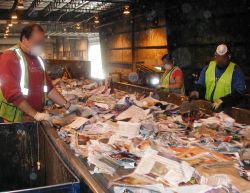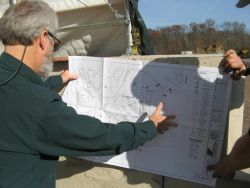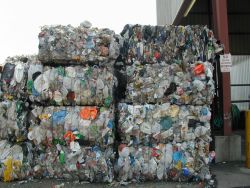Recycling Means Jobs
Reusing 10,000 tons of waste creates 28-296 jobs;
Recycling 10,000 tons of waste creates 36 jobs;
Landfilling 10,000 tons of waste creates 6 jobs;
Incinerating 10,000 tons of waste creates 1 job.
~ U.S. EPA and Institute of Local Self Reliance
Connecticut has opportunities in our ‘waste stream’. According to
2010 data collected by DEEP, we currently generate 3.18 million tons of ‘waste’ a year. Many of those discarded materials have value and can be reused or repurposed or recycled and made into new products. The CT Economic Resource Center, Inc. did a
study and estimated that in 2012, Connecticut had a total of $746 million in sales related to recycling activity, yet Connecticut is only recycling about 30% of its waste. We have many more materials in the waste stream such as plastics, glass, paper/fibers, organics, etc. that we could recover. Imagine how many more businesses could be developed to collect, transport, process, and manufacture those materials into new goods!
Recycling Means Jobs Legislative Day
On
February 28, 2013, the DEEP coordinated an educational forum at the state
Capitol to give legislators and other policy leaders the opportunity
to hear about the growing industry of reuse, recycling and materials recovery
and to help them understand the issues impacting this unique and diverse sector
of Connecticut's economy. These businesses add value to our economy and
significantly help Connecticut meet its recycling goals, which results in less
materials going to incineration and/or landfills, conserving valuable resources
and providing raw feedstocks to regional, national and global markets.
Here are some highlights of that day:
CT-N
videotape of Recycling Means Jobs Legislative Day event (1
hr. 36 min.)
Gov. Malloy Press
Release: Recycling Market Development Council Will Strengthen Economy,
Create Jobs, and Protect Environment
Related Topics
Many niches exist for waste-based businesses – activities in the recycling, reuse, and composting industries. The recycling and reuse sectors create more jobs per 10,000 tons of waste than landfilling or incineration enterprises. The Minnesota Pollution Control Agency
did a study and found 1.8% of employed people were directly employed in the reuse sector which includes used product sales, repairs, remanufacturing and rental services. Depending on the type of business you pursue, you may need local and state licenses or permits, funding, and a business plan.
Provides access to licensing and registration information needed to start, expand or relocate your business in Connecticut
Small businesses with operations in Connecticut, registered to conduct business for not less than twelve months, in good standing with all state agencies and with the payment of all state taxes, and employing not more than 100 employees, are eligible to apply.
DECD’s Office of Business and Industry Development (OBID) works closely with companies to address their short and long-term business needs, and strengthen their overall competitiveness in the global marketplace.
“A circular economy emphasizes durability, repairability, recycling, and remanufacturing, squeezing more value out of the resource base and generating greater employment. Companies will thrive on helping their customers derive the most functionality and service out of a product, rather than merely seeking to maximize sales.” – Stahl
Network of organizations that aim to tie together Connecticut’s exceptional resources to assist entrepreneurs grow at a faster rate throughout their early stages.
In collaboration with the U.S. Small Business Administration, the Connecticut State University System, public and private partners throughout Connecticut. SBDC provides a wide array of management and technical assistance to business owners and entrepreneurs for strengthening business performance and sustainability.
Membership organization, which connects non-profit organizations across Connecticut; training sessions, educational resources, advocacy tools, and opportunities to network and work collaboratively.
Connecticut Economic Resource Center, Inc. (CERC)
A non-profit corporation and public-private partnership that provides objective research, marketing and economic development resources consistent with mission of making Connecticut a more competitive business environment.
Business/UCC filings and forms, searchable CONCORD database.
Provides strategic capital and operational insight to push the frontiers of high-tech industries such as energy, biotechnology, information technology, and photonics.
Provides legal services to needy nonprofit organizations from the campus of University of Connecticut School of Law.
If you are engaged in the processing of recyclable materials by sorting, separating, baling or packaging for distribution and sale, then you are engaged in a solid waste management activity that most likely requires a solid waste permit or a registration approval from the CT Department of Energy and Environmental Protection. It is best to inquire which permits may be necessary by contacting the DEEP Permitting Ombudsman’s Office. They will direct you to the appropriate divisions within DEEP and can also arrange pre-application meetings to discuss your permit needs prior to submitting your permit application. Waste, recycling and materials management permits & general permit information and application forms can be found on the DEEP Waste Permits & Licensing webpage.
There are, however, certain types of businesses that do not need solid waste permits. Retail operations that focus on consignment and reselling donated materials such as thrift shops, used record stores, antique shops; and reuse centers that focus on art materials and building materials, for example, do not need a solid waste permit from the DEEP.
It is also advisable to contact the town or city in which you plan to do business and inquire about any zoning, conservation, building or other local permits that may be required. To learn more about local and state licensing requirements, visit the Connecticut Licensing Info Center (CT-CLIC).
We need CT manufacturers input on recycling! Please take a few minutes to participate in this
survey so that we can better understand the needs of CT manufacturers. Survey results will be used to better understand the market, its’ current trends, and to identify businesses that would be interested in using various types of materials.
Foundation Center A leading source of information about philanthropy worldwide. The Center maintains the most comprehensive database on U.S. and, increasingly, global grantmakers and their grants. Many Connecticut libraries have free access – ask your library’s business center if they have a subscription.
NY State Recycling Market Database (Northeast Recycling Council and NYS Empire State Development)
Interactive, on-line database to help users locate outlets for materials that can be reused, recycled or composted. The database also provides exposure to recycling and reuse businesses and helps end markets for recovered materials in and around New York State access the raw materials they need for production.
Report, database and interactive map that identifies large-scale food residual generators in CT.
Reuse Marketplace (NERC)
A free regional network to find, sell, trade, or give away reusable and surplus items that would otherwise be disposed as trash. Businesses, institutions, governments, and organizations in the states of Connecticut, Delaware, Massachusetts, New Jersey, New York, Rhode Island and Vermont are eligible to create accounts and to post listings. Anyone is welcome to search or browse the posted items.
Solid Waste and Recycling Data (CT DEEP)
State laws and regulations require solid waste and recycling data to be submitted to the Connecticut DEEP by municipalities and by permitted solid waste facilities. The types, amounts, and destinations of the different material collected and processed is used for variety of purposes. This data could help recycling processors, brokers and manufacturers looking for sources of specific materials for feedstocks for paper mills and/or other manufacturing businesses.
Recycling Market Development (NERC)
Presentation on various market development initiatives developed by the Northeast Recycling Council ranging from carpets, asphalt roofing shingles to composting and electronic waste.
An Overview of Creative Reuse Centers (The Reuse Alliance, 2010)
A comprehensive list of Creative Reuse Centers researched by The Reuse Alliance. They found over 40 creative reuse centers around the U.S and a few outside the U.S. Many are open to the public, but others are restricted to educators and/or arts organizations.
reSET (Social Enterprise Trust)
Promote, preserve and protect Social Enterprise; with an increasing demand for socially conscious businesses, reSet helps demonstrate this model is more sustainable and often even more profitable than the more traditional approach.
Content Last Updated August 8, 2025.





